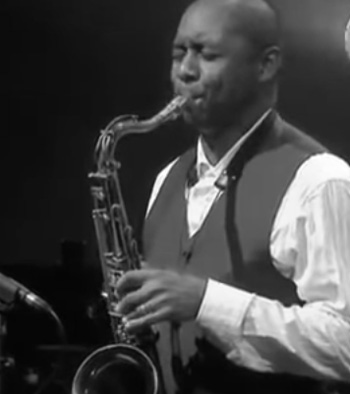
It’s not always easy attracting large audiences hungry for jazz of the undiluted, acoustic-based, hard-edged and tradition-rooted but forward-looking variety. Unlike others who remain true to that artistry-forward approach, saxophonist Branford Marsalis has a famous jazz-family name and well-earned critical kudos. And he has accumulated several circles of fans via his stint on The Tonight Show, his Sting residency, a Grateful Dead sit-in released as part of a box set, and appearances in Spike Lee and Danny DeVito movies. Some have followed his career since the early ‘80s, when he played with brother Wynton’s quintet and Art Blakey’s Jazz Messengers.
So what should one expect from a Branford show? Marsalis didn’t throw any pop-rock bones or drop groovy jams when he played the Mahaffey Theater in St. Petersburg—a formerly sleepy, lately hipped-up town that, during his chatty introduction, he called “kind of cool.” On the other hand, Branford and his regular bandmates—pianist Joey Calderazzo, bassist Eric Revis and drummer Justin Faulkner—never took their ambitious art to places so brainy or esoteric that only jazz heads could enter. Or, at least they never stayed on that plane for long during the 90-minute performance in front of about 1,050 enthusiastic listeners.
One notable entry point to the group’s originals and fresh arrangements of familiar tunes was the powerhouse playing of Faulkner. He often shifted from a simmer to a boiling explosion in no time flat; his combination of creativity, technical wizardry and urgent propulsion was somewhat reminiscent of Tony Williams, minus the latter’s penchant for rock-level volume.
Marsalis kept the proceedings fresh, in part, by offering a varied mix of styles. He opened on soprano, with a piece built on a loose-limbed Caribbean-tinted groove, and a solo constructed of short, chunky statements leading into longer phrases. He then shifted gears for an untitled lush ballad by Calderazzo, featuring the first of several dazzling extended solos by the pianist. Thelonious Monk’s music, always welcome, arrived courtesy of “Teo,” on which the saxophonist’s tenor initially matched Faulkner’s snare-drum cracks. Later, Marsalis was backed only by bass and drums for an earthy, piano-less section.
The group turned in its headiest post-bop explorations on the swirling, color-shifting, tenor-led “In the Crease,” which benefited from Faulkner’s well-timed bombs and explosive build-ups. But the quartet, with Branford on soprano, seemed to have the most fun pulling out two retro numbers—a jaunty, piano-rolling take on Depression-era gem “On the Sunny Side of the Street,” and W.C. Handy’s “St. Louis Blues.” For the latter, Tampa Bay area-based saxophonist Butch Thomas—who took over on sax when Marsalis left Sting’s band—guested on tenor, providing a sweet foil to the leader’s


No Comments comments associated with this post